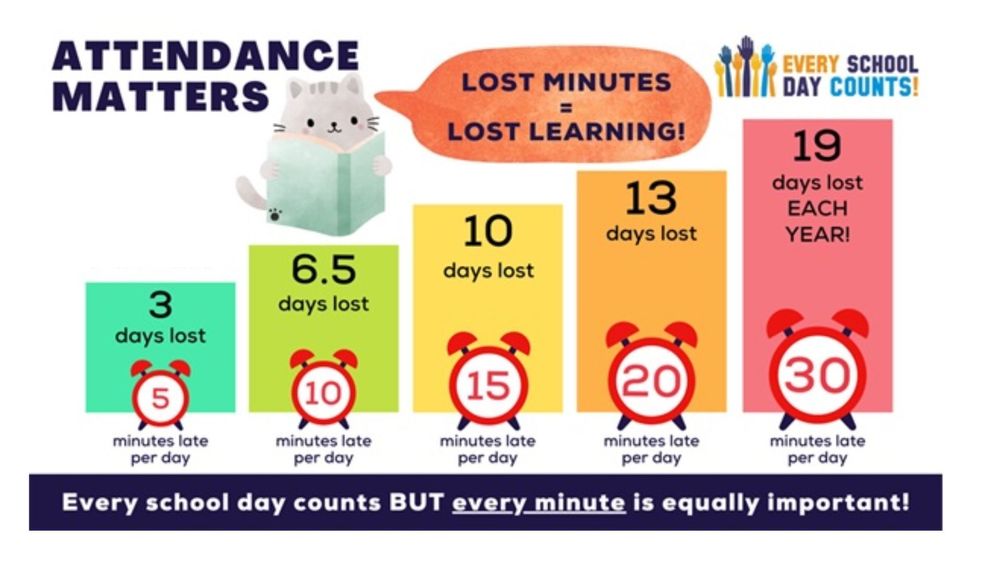Attendance and Truancy
Why Attendance Matters

Students who attend school regularly feel more connected to their school community and are more engaged in the learning process. As a result, they are more likely to earn better grades and test scores, and they have greater chances of graduating and achieving postsecondary success.
It is important to start setting good attendance habits in the child’s first year in school. Preschoolers who are chronically absent are likely to continue to be chronically absent as they get older in school.
From pre-K through high school, poor attendance can negatively affect students socially and emotionally:
They feel out of place
They fall behind in their work
They miss important opportunities that can inspire their future
They have a hard time working with others
They don’t see how school is connected to their future success
Students who are chronically absent or truant are more likely to have low grades and test scores, and they are less likely to be on track for high school graduation. Each week of absence per semester in ninth grade lowers the likelihood of graduating by 25 percentage points.
GCSC Attendance
Family Involvement
Families can help children achieve good attendance and stay on track at every grade level by:
- Understanding GCSC attendance expectations
- Making sure their child is prepared for the school day
- Notifying the school when their child stays home
On-Time Arrival
Arriving at school on time can make the entire day run smoother for students. When students are late, they can feel rushed, frustrated, and behind.
For elementary school students, being on time means that when the bell rings, students are in line with their class.
For high school students, being on time means that when the bell rings, students are in their classroom seats.
Students who are tardy must obtain proper documentation from the school office before proceeding to class.
School Attendance Procedures
Elementary schools take attendance during the first hour of the school day.
If a parent has not notified the school of a child’s absence, a school representative will phone the home of the student during the second hour of the school day.
GCSC District absentee robocaller automatically phones the home of every absent elementary student, even if their parent/guardian has previously informed the school of the absence
High schools take attendance during each class, but they are not required to call the home of absent students.
Family Vacations
Families can plan vacation travel and other commitments during holidays and on other non-attendance dates. For non-attendance dates during the school year.

Attendance Requirements
From age 6 until reaching age 17, a child who lives in Indiana must be enrolled and attend school. Once a child enrolls, even if they are younger than 6 or older than 17, they must go to school regularly.
GCSC Attendance Goals
GCSC has set ambitious but realistic district-wide attendance goals:
- For schools under 95%, increase attendance to 95%
- Decrease the chronic truancy rate at the district, network, and school levels
- Decrease the chronic absence rate at the district, network, and school levels

ABSENCES
Excused Absences
When your student must stay home from school, follow GCSC procedures to notify the school and provide a valid explanation so your student is not considered truant.
Valid Reasons for Student Absence
GCSC recognizes (6) Reasons for an absence to be considered excused:
Student Illness
This includes mental or behavioral health (As of January 1, 2022, absences can be attributed to mental or behavioral health for up to five days based on Public Act 102-0321.)
observance of a religious holiday
Absence note required
Death in the immediate family
Family Emergency
Circumstances which cause reasonable concern to the parent for their child's safety or health
Must be approved by the principal
Other situations beyond the control of the student
As determined by the principal
Communicating Your Child’s Absence to School
If your child must stay home, call your school to inform them your child will be absent.
Historically, GCSC has only been allowed to receive hard-form paper notes but we now can receive calls that can be honored to determine Excused and Unexcused absence status.
Home to school communication that qualifies for excused absence status must:
- Meet one of the valid causes for absence indicated above. AND
- Be memorialized through a paper, signed and dated note the first day your child returns to school from an absence. OR
- Be logged by the school in response to a direct phone call/voicemail to the school
Your written note and call should include the following information:
- Student’s name
- Room/division
- Date(s) of absence
- Reason for absence (must be one of the six valid reasons), with details explaining if there is a family emergency, concern for child’s safety, or situation beyond the student’s control.
- Parent/guardian signature, date, and phone number
Unexcused absences
When a student misses school and the student’s family/guardian has not communicated a valid reason for the absence to the school, the student is considered truant.
Medical Information and Conditions
- Inform your school if a physician diagnoses your child with any contagious/infectious disease, such as chicken pox, measles, etc.
- Get a written release from a doctor for your child to return to school if he or she is diagnosed with or suspected of having a communicable/nuisance disease
- Submit required medical reports to the appropriate school personnel
- Keep up-to-date on all your child’s health examinations and immunizations so your student does not miss school

